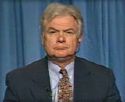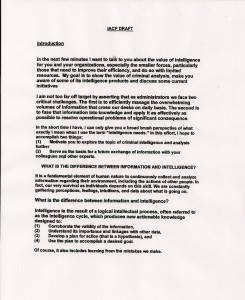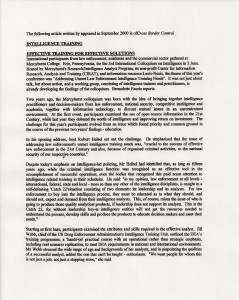|
2006
|
US
|
Policy |
DoD |
QDR Shift in Focus 18 Years After Gray and Steele Recommended Same |
|
2006
|
US
|
Policy |
Markowitz |
Defense Science Board Report on Transitions (NGO, OSINT) |
|
2006
|
US
|
Policy |
Peters |
Counterrevolution in Military Affairs |
|
2006
|
US
|
Policy |
Steele |
Terms of Reference for Intelligence Reform 1.1 |
|
2006
|
US
|
Policy |
Steele |
In Search of a Leader (Four Essential Reforms) |
|
2006
|
US
|
Policy |
Steele |
Electoral Refrom as Precursor to Intelligence Reform |
|
2006
|
US
|
Policy |
Tsuruoka |
Managing for the Future: Interview with Alvin Toffler |
|
2005
|
US
|
Policy |
Andregg |
Ethics and the IC: Breaking the Laws of God and Man |
|
2005
|
UK
|
Policy |
BASIC |
Think Tank Report on US Intelligence Incompetence |
|
2005
|
EU
|
Policy |
EU |
European Union Proposed Multi-National Intelligence Service |
|
2005
|
US
|
Policy |
Godson |
Culture of Lawfullness |
|
2005
|
US
|
Policy |
Steele |
ON INTELLIGENCE: Overview in Aftermath of 9-11 |
|
2005
|
US
|
Policy |
Steele |
Op-Ed on Condi Rice’s Active Deception |
|
2005
|
US
|
Policy |
Steele |
Cease and desist letter on Naquin |
|
2005
|
US
|
Policy |
Tama |
Princeton Review on Intelligence Reform |
|
2004
|
US
|
Policy |
Alexander |
Army G-2 Accepts OSINT as Separate Discipline |
|
2004
|
US
|
Policy |
Andregg |
Insanity of Planned Intelligence “Reforms” |
|
2004
|
AU
|
Policy |
Anon & Steele |
Update on OSINT in Australia |
|
2004
|
FR
|
Policy |
Clerc |
Cognitive Knowledge for Nations |
|
2004
|
US
|
Policy |
Cordesman |
Questions & Answers on Intelligence Reform |
|
2004
|
US
|
Policy |
Cordesman & Steele |
Questions & Answers on Intelligence Reform |
|
2004
|
US
|
Policy |
Simmons |
Congressman Simmons Letter to General Schoomaker on OSINT |
|
2004
|
US
|
Policy |
Steele |
DoD OSINT Program: One Man’s View of What Is Needed |
|
2004
|
US
|
Policy |
Steele |
Transcript of Steele at Secretary of State’s Open Forum 24 March 2004 |
|
2004
|
NL
|
Policy |
Tongeren (van) |
Need for Global Alliance for Human Security (Complete) |
|
2004
|
NL
|
Policy |
Tongeren (van) |
Need for Global Alliance for Human Security (Overview) |
|
2003
|
US
|
Policy |
Czech |
Steady State Revolution and National Security |
|
2003
|
CA
|
Policy |
Fyffe |
Intelligence Sharing and OSINT |
|
2003
|
CA
|
Policy |
Fyffe |
Intelligence Sharing and OSINT (Summary) |
|
2003
|
UN
|
Policy |
Lewis |
Creating the Global Brain |
|
2003
|
US
|
Policy |
Markowitz |
OSINT in Support of All Source |
|
2003
|
US
|
Policy |
Markowitz |
Open Source Intelligence Investment Strategy |
|
2003
|
US
|
Policy |
Steele |
Open Letter to Ambassadors Accredited to the USA |
|
2003
|
BE
|
Policy |
Truyens |
Intelligent vs. Intelligence: That Is The Question |
|
2002
|
Italy
|
Policy |
Politi |
11th of September and the Future of European Intelligence |
|
2001
|
US
|
Policy |
Heibel |
Intelligence Training: What Is It? Who Needs It? |
|
2001
|
US
|
Policy |
Heibel |
Value of Intelligence & Intelligence Training to Any Organization |
|
2001
|
US
|
Policy |
Oakley |
Use of Civilian & Military Power for Engagement & Intervention |
|
2000
|
US
|
Policy |
Berkowitz |
An Alternative View of the Future of Intellligence |
|
2000
|
RU
|
Policy |
Budzko |
Russian View of Electronic Open Sources and How to Exploit Them |
|
2000
|
US
|
Policy |
Ermarth |
OSINT: A Fresh Look at the Past and the Future |
|
2000
|
IT
|
Policy |
Politi |
The Birth of OSINT in Italy |
|
1999
|
US
|
Policy |
Allen (ADCI/C) |
OSINT as a Foundation for All-Source Collection Management |
|
1999
|
UK
|
Policy |
Rolington |
Changing Messages in Western Knowledge Over 400 Years (Slides) |
|
1999
|
UK
|
Policy |
Rolington |
Changing Messages in Western Knowledge Over 400 Years (Text) |
|
1999
|
UK
|
Policy |
Steele |
Snakes in the Grass: Open Source Doctrine |
|
1998
|
US
|
Policy |
Donahue |
Balancing Spending Among Spies, Satellites, and Schoolboys |
|
1997
|
FR
|
Policy |
Botbol |
The OSINT Revolution: Early Failures and Future Prospects |
|
1997
|
US
|
Policy |
Felsher |
Viability & Survivability of US Remote Sensing as Function of Policy |
|
1997
|
US
|
Policy |
Steele |
Intelligence in the Balance: Opening Remarks at OSS ‘97 |
|
1997
|
US
|
Policy |
Sutton |
Global Coverage ($1.5B/Year Needed for Lower Tier OSINT) |
|
1997
|
US
|
Policy |
Tsuruoka |
Asian Perceptions of What Is and Is Not Legal in Economic Intelligence |
|
1997
|
UK
|
Policy |
Tyrrell |
Proposals to Develop a NATO/PfP OSINT Capability |
|
1996
|
FR
|
Policy |
Clerc |
Economic and Financial Intelligence: The French Model |
|
1996
|
US
|
Policy |
Kahin |
What Is Intellectual Property? |
|
1996
|
US
|
Policy |
Steele |
Creating a Smart Nation (Govt Info Q and also CYBERWAR Chapter) |
|
1996
|
US
|
Policy |
Steele |
InfoPeace: OSINT as a Policy Option & Operational Alternative |
|
1996
|
US
|
Policy |
Steele |
Open Sources and the Virtual Intelligence Community |
|
1996
|
US
|
Policy |
Steele |
Protecting the Civilian Infrastructure as an Aspect of Information Warfare |
|
1996
|
US
|
Policy |
Zuckerman |
The Central Role of Open Source Economic Intelligence |
|
1995
|
US
|
Policy |
Prusak |
Seven Myths of the Information Age |
|
1995
|
US
|
Policy |
Steele |
Conference Executive Summary C/HPSCI and former DCI Colby |
|
1995
|
US
|
Policy |
Steele |
Creating a Smart Nation: Strategy, Policy, Intelligence, & Information |
|
1995
|
US
|
Policy |
Steele |
SMART NATIONS: NI Strategies and Virtual Intelligence Communities |
|
1994
|
US
|
Policy |
Ogdin & Giser |
Cyber-Glut, and What To Do About It |
|
1994
|
FR
|
Policy |
Schmidt |
Open Source Solutions 1994: The State of Intelligence |
|
1994
|
US
|
Policy |
Schwartau |
Letter on NII Security |
|
1994
|
US
|
Policy |
Schwartau et al |
Cross-Walk of 3 Experts' Spending $1 Billion per Year for NII Security |
|
1994
|
US
|
Policy |
Steele |
Communications, Content, Coordination, and C4 Security: Talking Points |
|
1994
|
US
|
Policy |
Steele |
Correspondence to Mr. Marty Harris, NII Commission |
|
1994
|
US
|
Policy |
Steele |
DATA MINING: Don't Buy or Build Your Shovel Until You Know What… |
|
1994
|
US
|
Policy |
Steele |
Expansion of Questions Posed by Senator John Warner to Aspin-Brown |
|
1994
|
US
|
Policy |
Steele |
Letter to the Open Source Lunch Club on PFIAB Being Useless |
|
1994
|
US
|
Policy |
Steele |
National and Corporate Security in the Age of Information |
|
1994
|
US
|
Policy |
Steele |
Private Enterprise Intelligence: Its Potential Contribution to Nat’l Sec. |
|
1993
|
FR
|
Policy |
Beaumard |
France: Think-tank to Anticipate & Regulate Economic Intelligence Issues |
|
1993
|
FR
|
Policy |
Beaumard |
Learned Nations: Competitive Advantages Via Knowledge Strategies |
|
1993
|
US
|
Policy |
Brenner |
Law and Policy of Telecommunications and Computer Database Networks |
|
1993
|
US
|
Policy |
Castagna |
Review of Reich, The Work of Nations |
|
1993
|
AU
|
Policy |
Chantler |
Need for Australia to Develop a Strategic Policy on OSI |
|
1993
|
US
|
Policy |
Cisler |
Community Computer Networks |
|
1993
|
US
|
Policy |
Civille |
The Spirit of Access: Equity, NREN, and the NII |
|
1993
|
US
|
Policy |
Fedanzo |
A Genetic View of National Intelligence |
|
1993
|
US
|
Policy |
Haver |
Intelligence Aim Veers to Amassing Overt Information |
|
1993
|
JP
|
Policy |
Kumon |
Japan and the United States in the Information Age |
|
1993
|
SE
|
Policy |
Leijonhelm |
Economic Intelligence Cooperation Between Government Industry |
|
1993
|
US
|
Policy |
Love |
Comments on the Clinton Administration's ‘Vision' Statement for the NII |
|
1993
|
US
|
Policy |
Petersen |
A New Twenty-First Century Role for the Intelligence Community |
|
1993
|
GE
|
Policy |
Schmidt |
History of Failure, Future of Opportunity: Reinventions and Deja Vu |
|
1993
|
US
|
Policy |
Steele |
A Critical Evaluation of U.S. National Security Capabilities |
|
1993
|
US
|
Policy |
Steele |
ACCESS: Theory and Practice of Intelligence in the Age of Information |
|
1993
|
US
|
Policy |
Steele |
Executive Order 12356, ‘National Security Information' |
|
1993
|
US
|
Policy |
Steele |
Reinventing Intelligence in the Age of Information (TP for DCI) |
|
1993
|
US
|
Policy |
Steele |
Reinventing Intelligence: The Advantages of OSINT |
|
1993
|
US
|
Policy |
Steele |
Role of Grey Lit & Non-Traditional Agencies in Informing Policy Makers |
|
1993
|
US
|
Policy |
Toffler (Both) |
Knowledge Strategies, Intellience Restructuring, Global Competitiveness |
|
1993
|
US
|
Policy |
Wallner |
Overview of IC Open Source Requirements and Capabilities |
|
1993
|
US
|
Policy |
Wood |
The IC and the Open Source Information Challenge |
|
1992
|
US
|
Policy |
Barlow |
EFF and the National Public Network (NPN) |
|
1992
|
US
|
Policy |
Castagna |
Review of Toffler’s PowerShift |
|
1992
|
SE
|
Policy |
Dedijer |
Open Source Solutions: Intelligence and Secrecy |
|
1992
|
US
|
Policy |
Gage |
Open Sources, Open Systems |
|
1992
|
US
|
Policy |
Greenwald |
Unrepresented Nations & Peoples Organization: Diplomacy's Cutting Edge |
|
1992
|
US
|
Policy |
Hughes |
An Affordable Approach to Networking America's Schools |
|
1992
|
US
|
Policy |
Kahin |
New Legal Paradigms for Multi-Media Information in Cyberspace |
|
1992
|
US
|
Policy |
Kahn |
Outline of a Global Knowledge Architecture, Visions and Possibilities |
|
1992
|
US
|
Policy |
Steele |
E3i: Ethics, Ecology, Evolution, and Intelligence |
|
1992
|
US
|
Policy |
Steele |
Inaugural Remarks Opening 1st International Conference |
|
1992
|
US
|
Policy |
Steele |
Information Concepts & Doctrine for the Future |
|
1992
|
US
|
Policy |
Steele |
OSINT Clarifies Global Threats: Offers Partial Remedy to Budget Cuts |
|
1992
|
US
|
Policy |
Steele |
Review Strassmann, Information PayOff |
|
1992
|
US
|
Policy |
Wood |
Remarks, Don't Be Suspicious of Contractors |
|
1991
|
US
|
Policy |
JFK Working Group |
National Intelligence and the American Enterprise: Possibilities |
|
1991
|
US
|
Policy |
Karraker |
Highways of the Mind |
|
1991
|
US
|
Policy |
Steele |
How to Avoid Strategic Intelligence Failures in the Future |
|
1990
|
US
|
Policy |
Steele |
Recasting National Security in a Changing World |
|
1957
|
US
|
Policy |
Wright |
Project for a World Intelligence Center |





